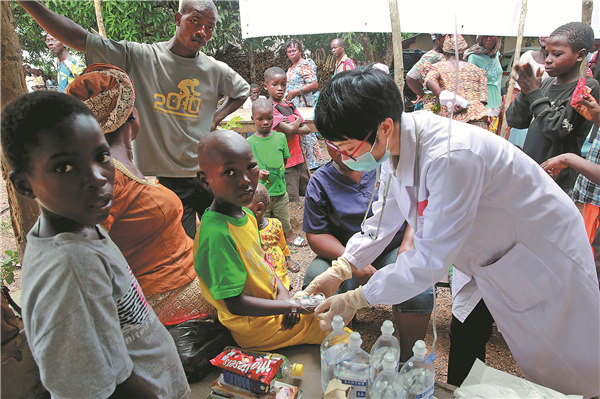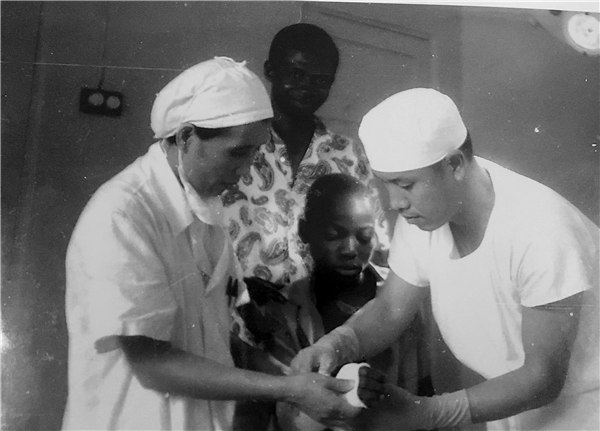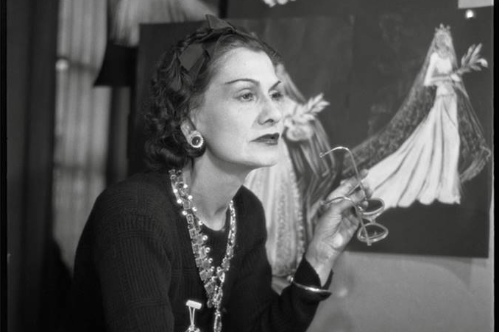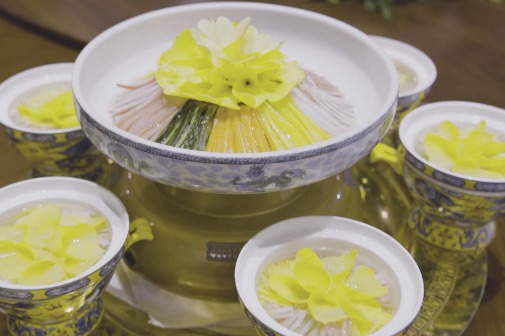Hunan hospital's ongoing medical partnership with Africa


Ninety-one-year-old Zhang Youming still has vivid memories of delivering babies in Algeria 61 years ago as part of the first batch of Chinese doctors sent to Africa.
In 1963, the gynecologist and obstetrics specialist at the Second Xiangya Hospital of Central South University in Changsha, Hunan province, was one of 13 doctors sent by the government to Algeria, which had just become an independent country.
She performed over 1,000 surgeries in two and a half years in the country, delivering many babies safely into the world.
When Zhang arrived at the hospital, she found most of the patients spoke Arabic and some spoke French, so she tried to learn both languages at night to communicate more easily with patients.
She clearly remembers saving one mother, who was hemorrhaging due to placenta previa, a condition in which the placenta covers the mouth of the cervix, and who later named her baby "Chinese" in Arabic.
"She gave her baby the name because she knew that I was a Chinese doctor and she wanted her baby to know that a Chinese person had saved his life," Zhang says.
Since 1963, Second Xiangya has sent 60 medical workers in 25 groups to Sierra Leone, Zimbabwe and Algeria, according to Li Zhihong, president of the hospital.
The workers were from departments including internal medicine, surgery, pediatrics, infectious diseases, anesthesiology, radiology and ultrasound, and treated hundreds of thousands of patients. Second Xiangya is one of the earliest tertiary hospitals in Hunan to send medical support teams to Africa, and has sent the most number of medical workers among hospitals in the province, he says.
Li Hejun, a now 86-year-old professor of orthopedics, was sent to Sierra Leone in 1973.

When he first arrived, conditions were as poor as the workers had expected. It did not have many resources and so the workers brought medical equipment with them, he says.
The male doctors had to sleep on the floor and even though the conditions were basic, Li said they were eager to work there.
"Every bit of the hospital was built by Chinese doctors and we started from scratch. We only needed to practice medicine in China, but in Sierra Leone, we were doctors, teachers, engineers, electricians and plumbers."
Teng Zhaoyu, a 51-year-old engineer at the Second Xiangya hospital's blood purifying center, was sent in 2016 during the Ebola epidemic to work at the Sierra Leone-China Friendship Hospital.
Hunan province sent 20 medical workers to Sierra Leone in February and June of 2016, and Teng was the head of the medical team.
"We were prepared for the worst before we went and some of us left goodbye notes for the family," he says. "However, as the team leader, I promised my coworkers and their families that I would bring them home safely."
The friendship hospital only had one doctor, so the Chinese doctors took over. Many local government officials visited for treatment, and after a senior official at the Sierra Leonian health ministry underwent surgery to remove fibroids, she was impressed by the work of the Chinese medical team, and arranged for 11 local medical workers to work at the hospital.
During the course of just over a year at the hospital, the team received around 40,000 patients and performed about 200 surgeries, Teng says.
Apart from treating patients, they also made great efforts to train medical workers and establish a working system and schedule for the hospital, so, hopefully, one day it can become one of the best hospitals in West Africa, he says.
Zhu Youfang contributed to this story.




































